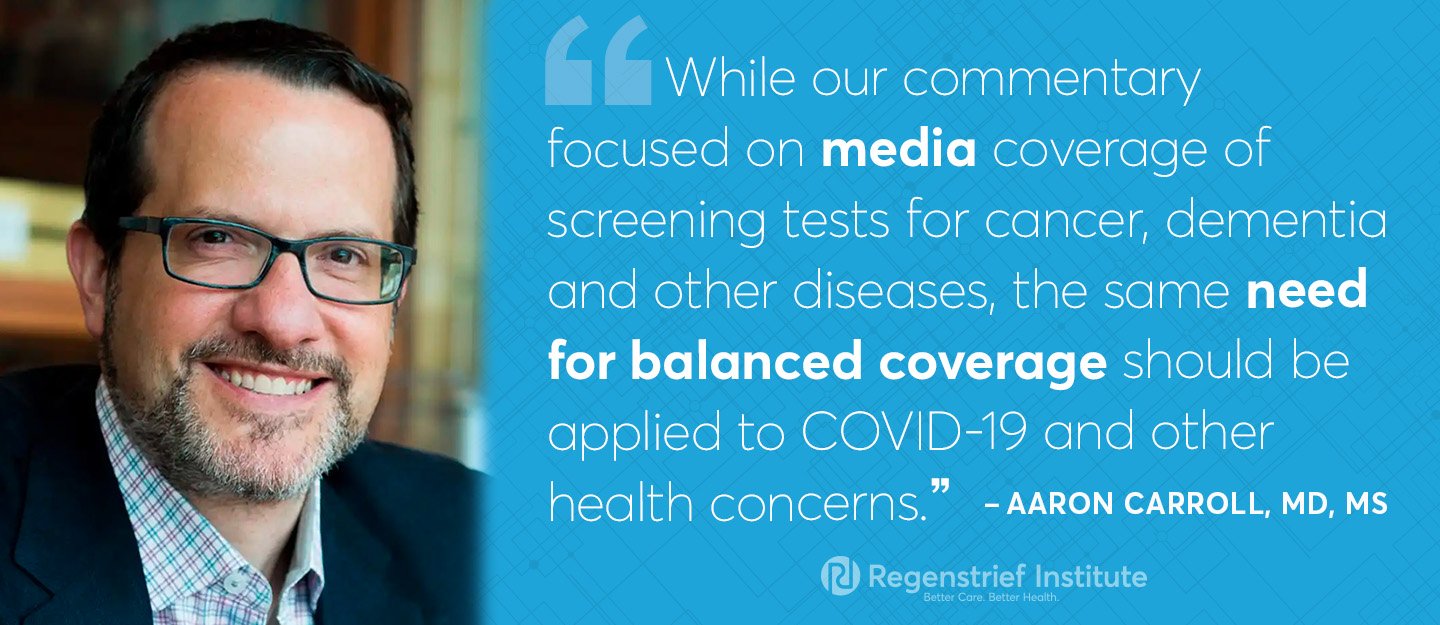The media covers health extensively, at no time more than during the pandemic. But that coverage often is not sufficiently nuanced.
In a JAMA Internal Medicine commentary focusing on media coverage of disease screening, Regenstrief Institute Vice President and Indiana University School of Medicine Associate Dean Aaron E. Carroll, M.D., and IU School of Medicine Assistant Professor of Pediatrics Tiffany S. Doherty, PhD, write that while people are hungry for good news about health, it does not serve them well for the media to provide good news exclusively.
“The media can be a respectable source of information for patients and their families as well as a useful public health tool, but only if media coverage of health is nuanced and, of course, accurate,” said Dr. Carroll. “While our commentary focused on media coverage of screening tests for cancer, dementia and other diseases, the same need for balanced coverage should be applied to COVID-19 and other health concerns.”
“We know that news coverage can influence anything from individual health behaviors to health care practice and policy, and we know that the associations can be positive,” Drs. Carroll and Doherty write in the commentary. But, they continue, “owing in part to the biased news they hear about screening tests, patients often overestimate how much risk reduction is associated with them and generally opt to receive them.”
Harms from screening of adults with no symptoms include false positives resulting in overdiagnosis and unneeded biopsies and treatment procedures. The commentary concluded that the public is not well served by media focusing exclusively on the upside of screening.
Given the media’s pivotal role as an influencer of individual health decisions, Drs. Carroll and Doherty encourage an open discussion with journalists on the data behind early screening tests, specifically on the need to focus on a risk-to-benefit ratio. This, they say, may assist in disseminating a more informed message on the use of screening tests. Encouraging disclosure or avoidance of conflicts of interest may also help to improve media coverage of health.
To best support medical decision-making and maximize public health benefit of media coverage, the commentary authors call for making patient expectations realistic rather than overly optimistic. Drs. Carroll and Doherty suggest media stories include clear information about harms as well as helping the public understand how to weigh benefits and harms in making medical decisions.
The commentary, “Media Representation of the Benefits and Harms of Early Testing: Implications for Public Health,” accompanied a global study of health coverage which examined 1,100 media stories on the benefits, harms and conflicts of interest of five technologies: liquid biopsy for cancers, three-dimensional mammography for breast cancer, Apple Watch Series 4 electrocardiogram for atrial fibrillation, blood biomarker tests for dementia, and artificial intelligence for dementia. These stories, of which almost two-thirds focused on benefits of screening without discussing harms, were published in newspapers, blogs, magazines, broadcast media, podcasts and on the web.
About Regenstrief Institute
Founded in 1969 in Indianapolis, the Regenstrief Institute is a local, national and global leader dedicated to a world where better information empowers people to end disease and realize true health. A key research partner to Indiana University, Regenstrief and its research scientists are responsible for a growing number of major healthcare innovations and studies. Examples range from the development of global health information technology standards that enable the use and interoperability of electronic health records to improving patient-physician communications, to creating models of care that inform practice and improve the lives of patients around the globe.
Sam Regenstrief, a nationally successful entrepreneur from Connersville, Indiana, founded the institute with the goal of making healthcare more efficient and accessible for everyone. His vision continues to guide the institute’s research mission.
About IU School of Medicine
IU School of Medicine is the largest medical school in the U.S. and is annually ranked among the top medical schools in the nation by U.S. News & World Report. The school offers high-quality medical education, access to leading medical research and rich campus life in nine Indiana cities, including rural and urban locations consistently recognized for livability.
About Aaron Carroll, M.D., M.S.
Aaron Carroll, M.D., M.S., is a best-selling author, a regular contributing opinion writer for national media outlets and is a faculty member, research scientist and serves in key leadership positions for the Regenstrief Institute and the Indiana University School of Medicine.
Dr. Carroll is the vice president for faculty development and a research scientist at Regenstrief Institute. He is also the chief health officer of Indiana University; the associate dean for research mentoring, a distinguished professor, Regenstrief Foundation Professor I, and the Bicentennial Professor and Professor of Pediatrics at IU School of Medicine. He serves as vice chair for health outcomes research faculty development in IU School of Medicine’s Department of Pediatrics.
He is the author of several popular books including “Don’t Swallow Your Gum!: Myths, Half-Truths, and Outright Lies About Your Body and Health” and, most recently, “The Bad Food Bible: How and Why to Eat Sinfully.” He hosts the popular YouTube channel “Health Care Triage” and has been a contributing writer to the New York Times, The Atlantic, Vox and CNN.









